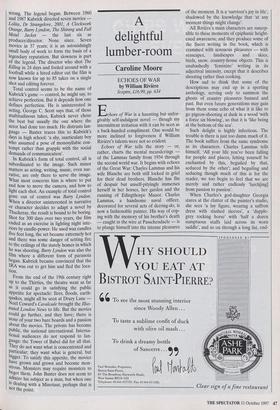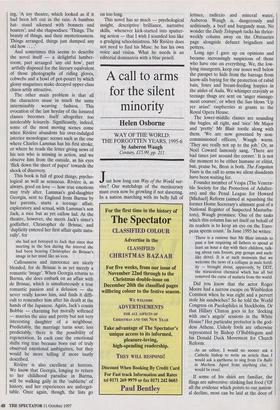A delightful lumber-room
Caroline Moore
• ECHOES OF WAR by William Riviere Sceptre, £16.99, pp. 634 Echoes of War is a haunting but unfor- givably self-indulgent novel — though my intermittent irritation with it can be seen as a back-handed compliment. One would be more inclined to forgiveness if William Riviere's talents were not so evident.
Echoes of War tells the story — or, rather, charts the mental meanderings — of the Lammas family from 1934 through the second world war. It begins with echoes of the Great War: Charles Lammas and his wife Blanche are both still locked in grief for their dead brothers. Blanche has fits of despair but unself-pityingly immerses herself in her horses, her garden and the running of Edingthorpe Manor. Charles Lammas, a handsome naval officer, decorated for several acts of derring-do, is now a fashionable painter. His way of cop- ing with the memory of his brother's death — caught in the wire at Passchendaele — is to plunge himself into the intense pleasures of the moment. It is a 'survivor's joy in life', shadowed by the knowledge that 'at any moment things might change'.
All Riviere's main characters are suscep- tible to these moments of epiphanic height- ened awareness; and they produce some of the finest writing in the book, which is crammed with sensuous pleasures — with seascapes, landscapes and skies, birds, snow, country-house objects. This is unabashedly 'feminine' writing in its adjectival intensity, except that it describes shooting rather than cooking.
How sad to think that some of the descriptions may end up in a sporting anthology, serving only to summon the ghosts of country pleasures banned and past. But even future generations may gain from them some echo of what it is like to go pigeon-shooting at dusk in a wood 'with a force six blowing', so that it is 'like being at the bottom of the sea'.
Such delight is highly infectious. The trouble is there is just too damn much of it. The book suffers from the same syndrome as its characters. Charles Lamrnas tells himself, 'All your life you've been falling for people and places, letting yourself be enchanted by this, beguiled by that, seduced by the other'; and beguiling and seducing though much of this is for the reader, we too begin to feel that we are merely and rather endlessly lurch[ing] from passion to passion'.
When Charles's god-daughter Georgia stares at the clutter of the painter's studio, she sees 'a lay figure, wearing a saffron dress with slashed sleeves', a 'dapple- grey rocking horse' with 'half a dozen sumptuous stuffs laid across its worn saddle', and so on through a long list, end- lug, 'A toy theatre, which looked as if it had been left out in the rain. A bamboo hat- stand adorned with bonnets and boaters'; and she rhapsodises: 'Things. The beauty of things, and their mysteriousness. Things arranged, things just dumped any old how....'
And sometimes this seems to describe the novel itself — a delightful lumber- room, part arranged 'any old how', part artfully disposed for the literary equivalent of those photographs of riding gloves, cobwebs and a bowl of pot-pourri by which glossy magazines make decayed upper-class chaos artily attractive.
The other main problem is that all the characters muse in much the same interminably weaving fashion. This evocation of the last heyday of the leisured classes becomes itself altogether too intolerably leisurely. Significantly, indeed, some of the most moving scenes come when Riviere abandons his over-indulged interior monologue: scenes such as the one where Charles Lammas has his first stroke, or where he reads the letter giving news of his son who is missing in action, and we observe him from the outside, as his eyes 'flick down the sheet of paper' towards the shock of discovery.
This book is full of good things, psycho- logical as well as sensuous. Rivilre is, as always, good on love — how true emotions may truly alter. Lanunas's god-daughter Georgia, sent to England from Burma by her parents, starts a teenage affair, exploratory and sexual, with Lanunas's son Jack, a nice but as yet callow lad. At the theatre, however, she meets Jack's sister's godfather, Christopher de Brissac, and 'duplicity entered her first affair quite natu- rally', for
she had not betrayed to Jack that since that meeting in the box during the interval she had been bearing Christopher de Brissac's image in her mind like an icon.
Callousness and innocence are nicely blended, for de Brissac is as yet merely a romantic 'image'. When Georgia returns to Burma, she does embark on an affair with de Brissac, which is simultaneously a true romantic passion and a delusion — she never really knows him, and finds it diffi- cult to remember him after his death at the hands of the Japanese. Again, Jack's cousin Bobbie — charming but morally softened — marries the nice and pretty but not very interesting daughter of a neighbour. Predictably, the marriage turns sour; less predictably, there is the possibility of regeneration. In each case the emotional shifts ring true because born out of truly observed emotional ambiguities, but they would be more telling if more tautly described.
Riviere is also excellent at horrors. We know that Georgia, longing to return to her childhood paradise in Burma, will be walking gaily in the 'oubliette' of history, and her experiences are unforget- table. Once again, though, the lists go
on too long.
This novel has so much — psychological insight, descriptive brilliance, narrative skills, whenever kick-started into sputter- ing action — that I wish I sounded less like a grudging schoolmistress. Mr Riviere does not need to fmd his Muse: he has his own voice and vision. What he needs is an editorial dominatrix with a blue pencil.



















































































 Previous page
Previous page